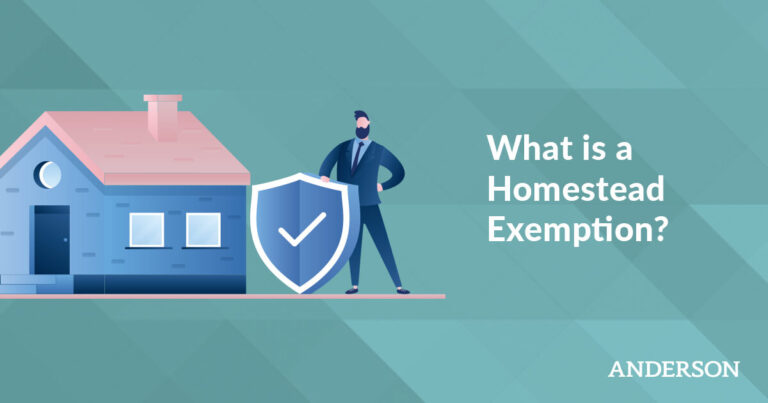How Does a Homestead Exemption Work?
Updated October 7, 2021
Your personal residence is where you create memories and raise your family. It’s special and worth protecting. Beyond that, 62% of Americans’ wealth is tied up in their personal residences. Here at Anderson, we talk a lot about asset protection for real estate investments, but I also receive a lot of questions from clients about the best ways to protect their personal residences, including the homestead exemption.
From an investing and business standpoint, there are so many places where little mistakes could result in big price tags. Right now, toxic mold seems to be the latest fad in real estate lawsuits, but there are so many other sources of liability in business and investing: COVID-19, breach of contract, ADA compliance, worker’s compensation…the list goes on and on. But it can be easy to overlook the liability inherent in our everyday lives, which could easily threaten our personal residences.
For instance, if you have children, there are multitudes of ways your kids could be a source of liability for you. Driving down the road and potentially getting into a car accident is another. These are common, everyday examples of liability that could result in lawsuits. A lawsuit could then result in a judgment against you, which could threaten your personal assets, including your residence.
Homestead Exemption Defined
So, what exactly is the homestead exemption? The homestead exemption provides special protections to a debtor’s residence against most general creditors. It’s put in place to protect the home considering its significant social function as a place to raise children and create safety for our families. To that end, the courts will actually favor protecting the home against judgment creditors.
The problem we run into with the homestead exemption is that the amount of protection varies from state to state. Furthermore, the process to secure the homestead exemption can vary, as well. For instance, some states require the homeowner to file a declaration of homestead.
Some states offer unlimited homestead exemption, with no cap on the value that is exempt from the reach of creditors. These states are Texas, Florida, Oklahoma, Kansas, Arkansas, Iowa, and South Dakota. These are the best states in the nation for protecting personal residences.
Other states offer virtually no protection. These include the $5,000 homestead exemption caps in Kentucky, Tennessee, and Virginia. Missouri’s homestead exemption is only $15,000. Moreover, two states actually offer zero protections. These are New Jersey and Pennsylvania.
Most often, what you’ll find is that the majority of states have a homestead exemption somewhere between these two extremes. The range can go from as low as $25,000 to upwards of $605,000, which is the case in Nevada.
Exceptions to Homestead Exemption
It’s important to note that, even in states with unlimited homestead exemption, there are still exceptions to this regulation. The number-one exception to homestead exemption is creditors who are tied to the property. This includes mortgage holders and others who may have put a lien on the property or are in some way connected to that property’s value, including service providers for home improvements. And of course, the government supersedes all else and can bypass a homestead exemption.
Another exception to homestead exemption protections is money that’s been acquired through fraudulent activities. If the money invested in the homestead is deemed to have been acquired as a result of fraud, a judge will override the homestead exemption.
A third scenario in which homestead exemption does not apply is in the case of divorce and/or child support.
Finally, it’s important to keep in mind that, generally, only one property is covered by homestead exemption. Second residences and rental properties are excluded.
Creative Solutions on top of Homestead Exemption
Whether your state offers unlimited, very little, or no homestead exemption, there are still options to protect your personal residence. Here at Anderson, we use creative solutions to ensure that your assets are protected. One possible strategy to reduce the observable equity in your home is to take out a home equity line of credit (HELOC). The thing about a HELOC is that you don’t have to actually use the line of credit, but to make sure that their money is protected, the bank will place a lien against the home whether you use the credit or not. This is an example of equity stripping, and it immediately lowers the equity in your home to an outside observer who may be looking to take your assets.
Another potential strategy to protect your personal residence is to keep your personal name off public record. This is a fundamental layer of asset protection because they can’t take what they don’t know you have. So, keeping your ownership private provides a baseline layer of protection. One way to remove your name from public record in connection to the ownership of your personal residence is to deed the residence into a land trust. Land trusts are revocable trusts, meaning you can take properties in and out of them, and you remain the beneficiary of the trust. Keep in mind with this strategy that you absolutely need to seek professional assistance when setting up a land trust. This is not the area where you want to go it alone or use DIY solutions because you could very easily find yourself faced with massive transfer taxes, among other pitfalls.
One more possibility is to use an LLC in conjunction with a land trust. This adds an additional obstacle to a potential plaintiff’s attorney’s search. The more layers of asset protection, the more likely that plaintiff’s attorney is to settle for insurance or go after more low-hanging fruit.
Seek Expert Guidance
If you’re interested in discussing these and other strategies in more detail specific to your situation, schedule a one-on-one consultation with a Senior Advisor at our firm now. Our Senior Advisors use these strategies themselves and have assisted hundreds if not thousands of clients in using them, as well. On the call, you and a Senior Advisor will discuss the best options for entity structuring, asset protection, and tax reduction customized to your individual situation. You can schedule online or by calling 888.871.8535.
Bonus Video
















